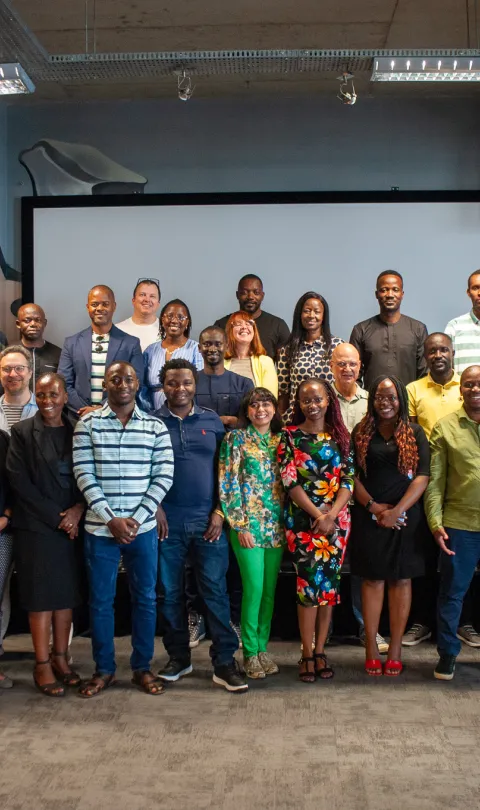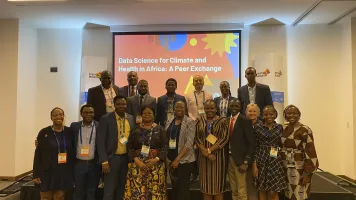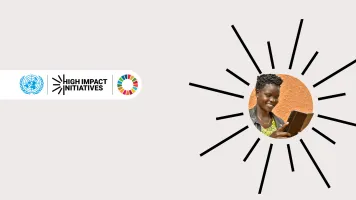The World Health Organization (WHO) projects that climate change will lead to an additional 250,000 deaths annually between 2030 and 2050, with Africa bearing the brunt of these impacts. The strong link between climate change and health is particularly evident on the continent, where 60 percent of the population depends on climate-sensitive sectors like agriculture. Addressing these intertwined challenges demands more than traditional approaches; it requires data-driven solutions that can guide decision-making and policy interventions.
This critical role of data in addressing climate and health challenges was front and center at the Data Narratives for Climate and Health in Africa event, held from October 8-10, 2024, in Cape Town. Organized by the Global Partnership for Sustainable Development Data, the gathering brought together data experts, policymakers, and health professionals to explore innovative solutions that leverage data for climate resilience and health outcomes.

Participants at the Data Narratives for Climate and Health in Africa workshop in Cape Town, October 2024. Photo credit: Carl Teffo.
Data at the heart of climate-health solutions
Africa's vulnerability to climate-related health challenges has spurred a growing recognition of data's power to drive impactful change. Through initiatives like the Power of Data (PoD) High Impact Initiative, countries are increasingly using data to address these pressing issues. Participants from countries such as Kenya, Botswana, and Ghana presented their national approaches to harnessing data for climate and health resilience. These presentations illustrated how data is being used to track health risks and inform responses, such as predicting malaria outbreaks based on climate trends or monitoring water quality for vulnerable communities.
A key theme from the event was the need for stronger partnerships between national statistical offices (NSOs), health and environment ministries, climate data experts, and policymakers to build cohesive strategies. The event also emphasized the importance of aligning climate and health goals with national data strategies and including plans for statistics development, underscoring that data is not just a technical tool but a foundation for sustainable development policies.
Building capacity for data-driven solutions
The Africa Climate and Health Data Capacity Accelerator Network (CAN) fosters the skills necessary for this transformation. Fellows from countries such as Kenya and Guinea, who are part of the initiative’s fellowship component, have been applying data science techniques to solve climate and health challenges, from improving heat stress mitigation strategies to tracking the impacts of climate migration on health systems.
The event included technical training delivered by OpenUp, focusing on practical skills such as data acquisition, visualization, and user-centered design. One standout feature was the introduction of tools like EO Browser for satellite imagery and Exploratory.io for exploratory data analysis, which generated significant interest among participants. These tools allow decision-makers to access and analyze real-time data, making them indispensable for developing timely and effective interventions in the health and climate sectors.

Participants at the Data Narratives for Climate and Health in Africa workshop in Cape Town, October 2024. Photo credit: Carl Teffo.
Fostering cross-sector collaboration
One of the most significant outcomes of the Cape Town event was its role in fostering cross-sector collaboration. A roundtable discussion, which brought together participants from various sectors and countries, focused on how to integrate data-driven solutions into national data systems and public health strategies. Representatives from governments, non-governmental organizations, and data practitioners worked together to identify synergies between health and climate data initiatives, recognizing the need for a coordinated approach to tackle these complex challenges.
The conversations highlighted the importance of leveraging national data partnerships created through the Power of Data arrangements to strengthen collaboration, reduce fragmentation in the sector and enhance the flow of investment while positioning NSOs as key players in climate and health data initiatives. National data strategies were discussed, with a focus on how they could be aligned with the National Strategy for the Development of Statistics (NSDS) to improve health outcomes and resilience in the face of climate change.
The road ahead: scaling data-driven resilience
The event highlighted the pivotal role of data-driven solutions in combating climate and health challenges. With the 2030 deadline for the Sustainable Development Goals approaching, it is imperative to accelerate investment through initiatives like the Power of Data (PoD) and the Capacity Accelerator Network (CAN). These programs are critical in leveraging data to enhance resilience and improve health outcomes across Africa. The urgency of this moment cannot be overstated—investing now is essential to avoid reaching the climate 'tipping points' and to ensure sustainable development across Africa and beyond.


